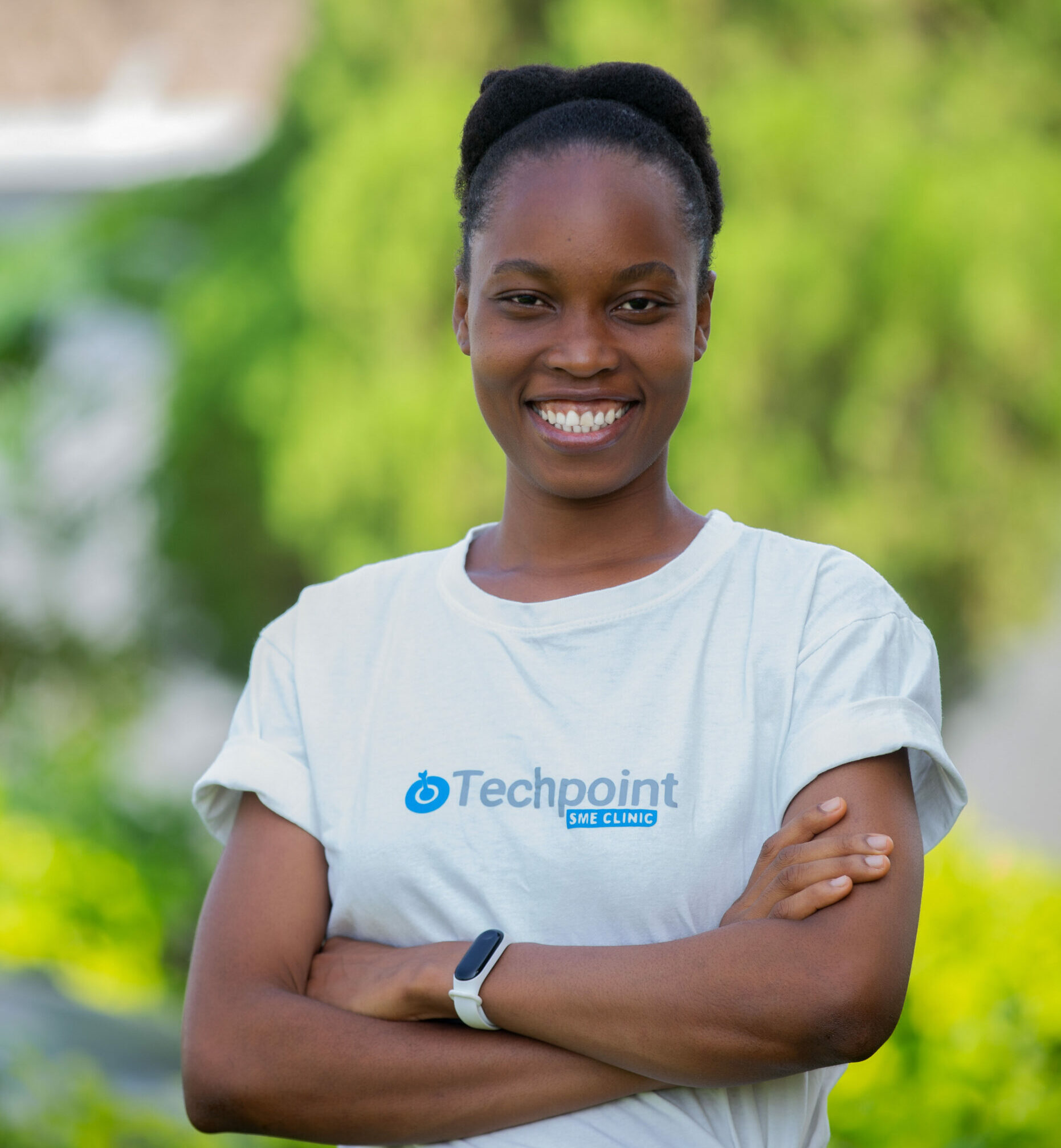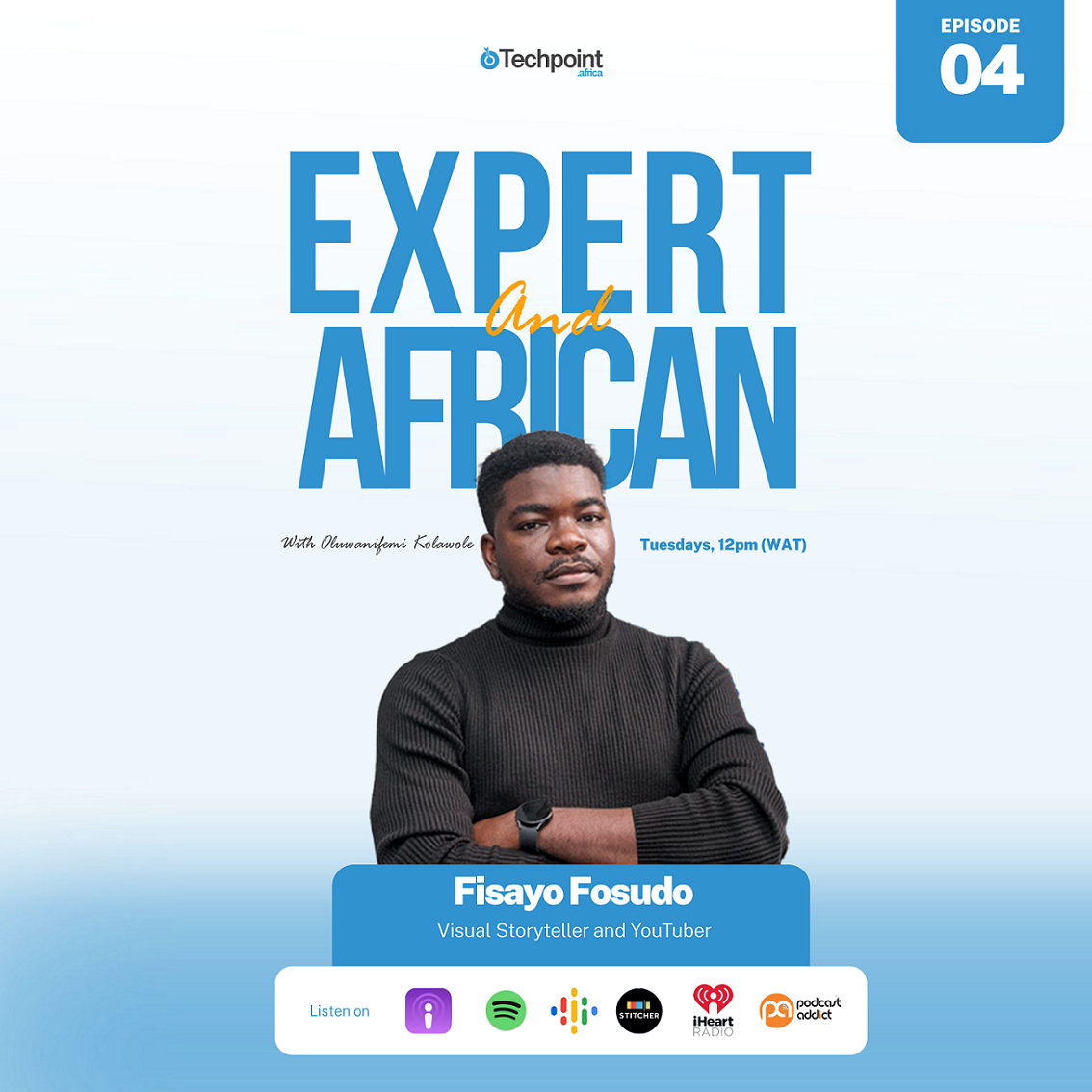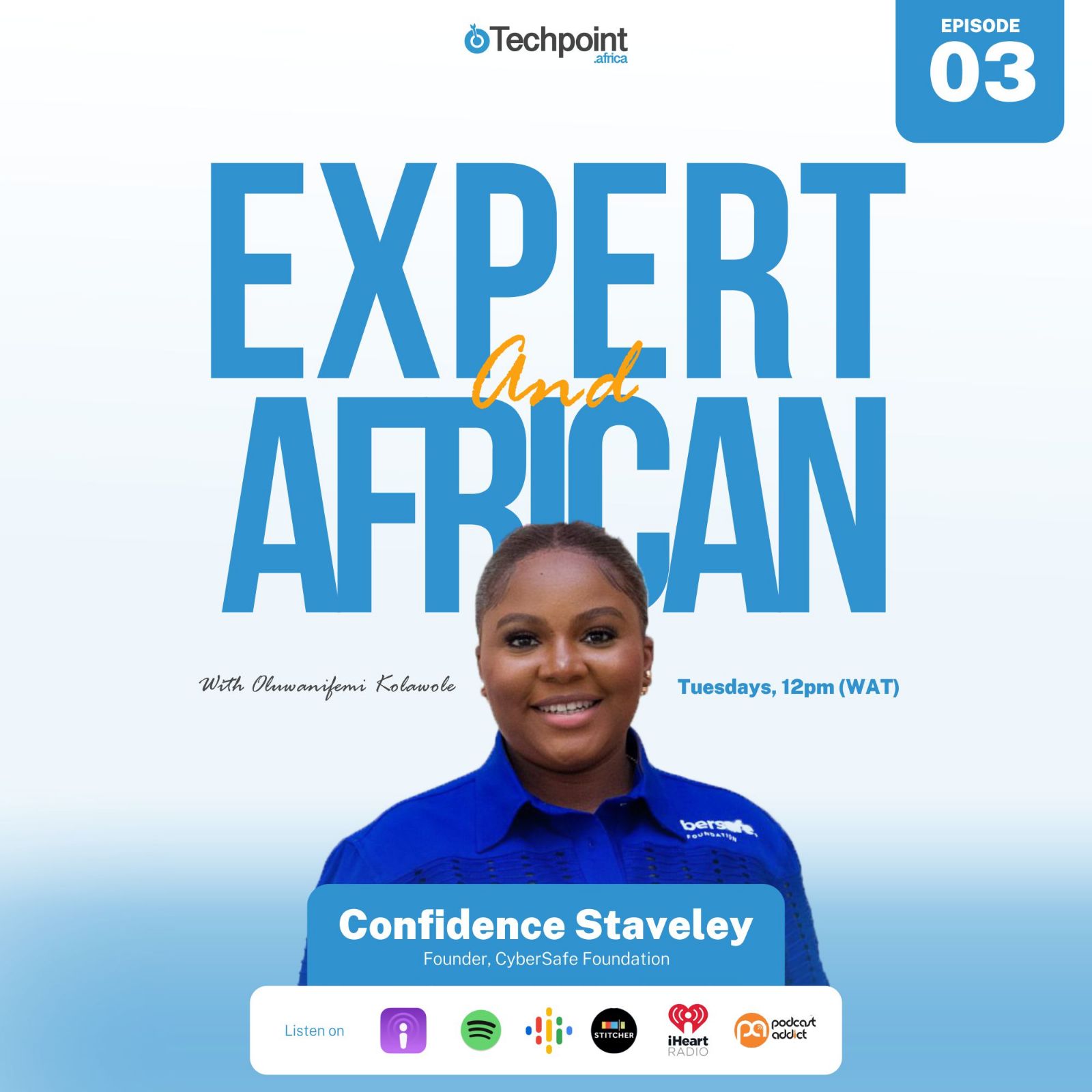Episode Transcript
Announcers: And winner is Fisayo Fosudo!!!!
Fisayo Fosudo: Thank you. Okay. This was not expected all. Uh, thank you very much
Oluwanifemi Kolawole: At Techpoint Awards 2021, 5 individuals made the nomination list for the Tech Influencer of the Year Award. Based on votes cast by the Techpoint Africa audience, Fisayo Fosudo, an independent Nigerian YouTuber and content creator emerged as the winner. It reflected in his heartfelt acceptance speech that the recognition is a validation that the effort s he puts into what he does are not in vain.
There are a few numbers to note here. The first is six, the years Fisayo has been a YouTuber. 249, number of videos he has published on YouTube. 295,000, The number of subscribers on his YouTube channel. And 17.8 million, total number of views on his content.
Fisayo Fosudo: I was able to start making videos because I placed a bet on myself. I was a bit intentional in the beginning I knew that this is what I wanted to do in a way. And I was going to make it work by force.
Oluwanifemi Kolawole: Welcome to another episode of Expert and African, where we spotlight African tech specialists and their journey from newbie to expert.
Today's episode puts the focus on Fisayo Fosudo, a popular Nigerian visual storyteller, YouTuber, and one of the 26 YouTube black voices creator class of 2022 from Africa. We explore how he puts together all the skills in content creation, graphics designing video production, and love for books and tech into fueling his passion for storytelling through discipline and consistency.
Fisayo Fosudo: I’m Oluwanifemi Kolawole. I’m Fisayo Fosudo.
Oluwanifemi Kolawole: A perfect place to begin Fisayo's story is how we picked up several skills to put into his current practice.
Lagos-born Fisayo was fortunate from childhood to find himself around people who are supportive and whose interest aligned with his. For starters, his parents made sure he was serious about acquiring knowledge and doing well in school. An uncle, he was also close to was behind his interest in tech and his love for books.
By the way, Fisayo's creative side has always been there for as long as he can remember.
Fisayo Fosudo: I was a graphic designer. I could draw. Before I entered university, I was drawing comics. I was selling comics.
Oluwanifemi Kolawole: And it didn't stop at that.
The thought of going the art class route in secondary school was silenced by his parents as quickly as it came. And here is one decision Fisayo is grateful he was stopped from going forward with. Because eventually winding up in a commercial class birthed his love for economics. That explains how we ended up as an economics graduate from the University of Lagos.
As an undergraduate, Fisayo played an active role in his department contrasting his introverted personality. He occupied a position where he was responsible for idea development and thinking up programs. He was the social director for the Nigerian Economics Student Association. A position he earned and maintained because of his ability to create content, raise funds, and design brochures. While at that he made conscious efforts to hone his graphic designing skills.
Fisayo Fosudo: I really loved graphics designing because I had this art background. I appreciate visually creative stuff. So I had that art background, I mixed it to graphic design and I became a fairly good graphic designer. I really loved like the tech behind the design.
Oluwanifemi Kolawole: So his two internship experiences, his first official job, and several paying gigs were in that field. In fact, Fisayo has always...
Fisayo Fosudo: had a likeness for creative companies.
Oluwanifemi Kolawole: Straight out of the university, Fisayo got his first official job at one of Nigeria's earliest logistics startups, MAX.ng in 2015, where he was a brand developer and a social media strategist. And his responsibilities also led him to develop video production skills.
Fisayo Fosudo: It was the first job that gave me a role that I was able to explore a lot. I learned so much on the job at MAX. I grew as a designer there. I learned, video production on the job.
Oluwanifemi Kolawole: With a love for books and art, an attraction to economics, and a deliberate decision to learn video production, the recipe for Fisayo to begin a new phase was all complete. And in 2016, he decided it was time to take the bold step.
Fisayo's attraction to YouTube was influenced by his fondness for getting reviews before buying a product and his likeness for what the popular American YouTuber MKBHD does. So he desired to do something similar for his demography in Nigeria.
Fisayo Fosudo: I really like the quality of his work and how he presents stuff. That was one of the major motivations for me. And I've known him before I even started, but I couldn't really afford the gear.
Oluwanifemi Kolawole: But that's not all,
Fisayo Fosudo: I also wanted give value because I was passionate about tech
Oluwanifemi Kolawole: As it were, looking up to someone doing what you'd love to do and passion doesn't seem to be enough. Fisayo knew he had to take action, but what he did seems drastic and borderline risky.
Fisayo Fosudo: I placed that bet on myself. I took money I saved for a year and I just like, you know what, let me get gear and let me just start this thing.
Oluwanifemi Kolawole: That was 2016 while he worked at MAX.ng and did gigs. Under a year, he saved up $5,000, which was about ₦2 million as of the time.
Fisayo Fosudo: I took all that money. And I just said, you know what, maybe I should just buy video production gear and see if I can start making videos on the internet.
Oluwanifemi Kolawole: Six months down the line, he wasn't getting any returns on his huge investment, but it was impossible to give up on what he had spent so much on. So he didn't stop. Although his videos were months apart. He did gadget reviews on the devices he owned, but there was barely any attention. For some reason he knew it would ultimately payoff.
Proud of how far he has come, Fisayo remembers his first few videos and what he got wrong with them.
Fisayo Fosudo: The first few videos I made, they're still on my channel and I hate them so much. I was forming accents. I was just pretending to who I wasn't. And it just didn't make sense. So I think after the third video, I now became real and I just started talking like myself. And that was when I noticed that people were paying attention. There was no need for me to fake it. I could have just come online and just be myself. So that was when people started noticing, then that was when the phone companies started coming. They were like, oh, this person is like us he speaks our language.
Oluwanifemi Kolawole: And that was his inflection point.
Fisayo is a crop of the early Nigerian YouTubers who decided to focus on a niche area -- tech and gadget reviews, something foreign creators that have massive international reach have already taken over. But that wasn't enough to deter him.
2017 was when he began getting attention. Through networking and recommendations, he started getting smartphone review requests from TECNO and Samsung. But that was only the beginning.
At that point, he had stopped this 9 to 5 job at MAX.ng. Imagine what his parent's reactions were.
Fisayo Fosudo: I remember them asking me when will you get a real job? when I started
Oluwanifemi Kolawole: If anything has remained consistent with Fisayo's videos since his first product review in November 2016, it's a deliberate attempt to deliver value with top video quality output. And over five years later, he's innovating and has remained relevant.
Talking about what gave him the boldness to take such a huge risk at the beginning of his career and also scale through the challenging times.
Fisayo Fosudo: I was reading a lot of books at the time, and I knew for a fact that, you know, there's this thing with reading books, if you read books, you stand on your shoulders of giants. When you read books, you have a template to know what is going to happen next.
Oluwanifemi Kolawole: These treasures taught him how to be unique, how to optimize knowledge, how to be frugal, how to focus and also how to innovate around challenges. Think and Grow Rich by Napoleon Hill, Rich Dad Poor Dad by Robert Kiyosaki, The Richest Man in Babylon by George S. Clason, How to Control your Thoughts by Maulin Hendriks, Ignore Everybody by Hugh MacLeod, Mastery by Robert Greene, Stop Acting Rich, and The Millionaire Next Door by Thomas J. Stanley all stood out for him out of the lot.
What keeps Fisayo going are his parents' supportiveness and the consistent feedback he gets from them. And also.
Fisayo Fosudo: My to do list. I have a lots of videos to make. It is also profitable in a way.
Oluwanifemi Kolawole: Fisayo makes money from working with different brands like Samsung, TECNO, Infinix, Oraimo, Sony, and Oppo among others, as well as earning ad revenue from YouTube.
Monetization on YouTube is a factor of cost per mille, (CPM) where 'mille' stands for a thousand. CPM is the amount of money advertisers are willing to pay for every 1000 views of their ads. This is not the same as the total number of views on a particular video, but only viewers who watch an ad for at least 30 seconds are considered monetized views.
On average, for every 1000 monetized views on a particular content Fisayo puts out, he could get between $1 and $40 depending on the type of content. He understood much later that some content like finance-related ones, by default, bring in much more CPM compared to tech.
In a month, Fisayo could make over 5,000 dollars from YouTube. This pales in comparison to the $90 or less he made in the early years.
Fisayo talks about a time he wasn't frugal and it began to get him worried. Then he made a decision at the beginning of 2020.
Fisayo Fosudo: I had a hundred thousand subscribers in 2020, but you see, I did not have savings. At some point I was ready to give up on everything. It was at that time, I said, you know what? I'm going to decide that every single money that I make, 70% would go into this fixed deposit. which was a foolish decision.
Oluwanifemi Kolawole: This was a one year fixed deposit plan, which he considers extreme. Well, the good part was when it matured in December of the same year, he had saved up to $10,000 from which he rented a suitable place and took a vacation to Dubai in January, 2021, where he shot his first Finance Friday episode after four years of making only tech videos.
Asides from the profitability, which Fisayo believes can always get better, he's further driven by a need to meet several brand requests. In his studio is a white board with an array of content he has to make. So, he can't afford to be inconsistent.
Fortunately, he's able to do more with a team of four and he's deliberate about the content he pushes out as it requires a lot of reading, a lot of research to give out well rounded views on topics. It takes him and his team between three to seven days to make one video.
And because of the amount of work it requires to keep a personal brand alive, he admits that achieving a work life balance is almost non-existent. But, he finds time to unwind by watching documentaries and animations, going to the movies and reading books.
Lately, Fisayo has been honoring speaking invitations at events to establish himself as a thought leader in the space. At the Techpoint Africa Blockchain Summit , he moderated a panel of blockchain experts to discuss NFTs DAOs, DeFi and the era of decentralised opportunities.
Among other awards, Fisayo is particularly proud of the recognition he got from Google earlier in the year, when he was one of the 26 Africans in the YouTube Black voices creator class of 2022 that were recognized for hitting subscriber milestones, pursuing new businesses or leading meaningful conversations related to ,black life and culture.
This gave Fisayo access to funding, partner support, training, and a rich network of professionals.
Fisayo dreams of time when he will become a Harvard or Oxford university alumnus.
Fisayo Fosudo: I would want to see what it feels like to study among some of the very brightest minds in the world and get a sense of just being among that environment.
Oluwanifemi Kolawole: Fisayo advices interested YouTubers to take advantage of the diverse tools and materials available online before starting, they should have a defined plan on the value they want to offer, and also not be afraid to make mistakes while being consistent.
Fisayo Fosudo: And don't quit your day job. The last thing you want to be broke creative.
Oluwanifemi Kolawole: Thank you for listening to Expert and African. This script was adapted and voiced by Oluwanifemi Kolawole. Produced by Muyiwa Matuluko. This is a production of Techpoint Africa. If you enjoyed this podcast, please subscribe, share, and drop a review. For most stories on startups and innovation in Africa, please visit techpoint.africa.




